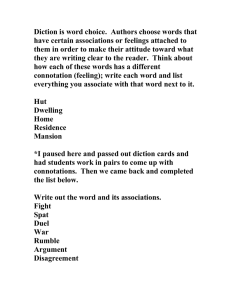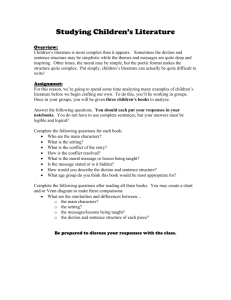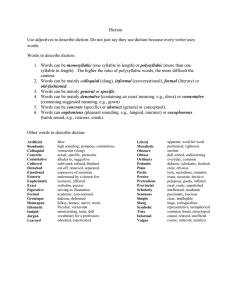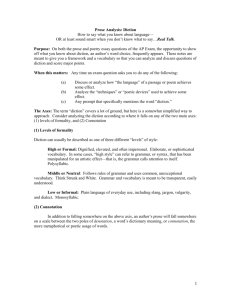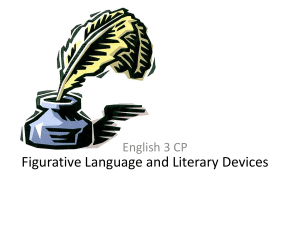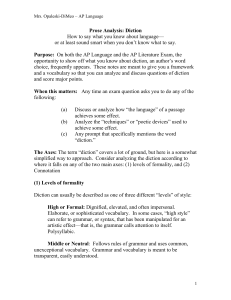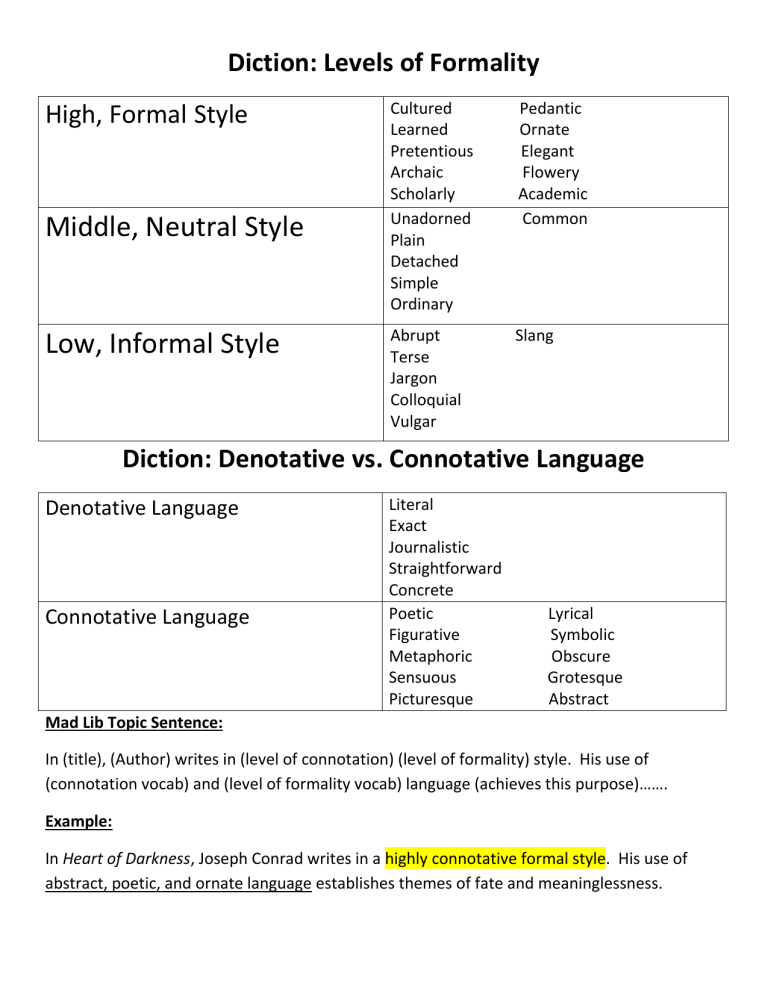
Diction: Levels of Formality High, Formal Style Middle, Neutral Style Low, Informal Style Cultured Learned Pretentious Archaic Scholarly Unadorned Plain Detached Simple Ordinary Pedantic Ornate Elegant Flowery Academic Common Abrupt Terse Jargon Colloquial Vulgar Slang Diction: Denotative vs. Connotative Language Denotative Language Connotative Language Literal Exact Journalistic Straightforward Concrete Poetic Figurative Metaphoric Sensuous Picturesque Lyrical Symbolic Obscure Grotesque Abstract Mad Lib Topic Sentence: In (title), (Author) writes in (level of connotation) (level of formality) style. His use of (connotation vocab) and (level of formality vocab) language (achieves this purpose)……. Example: In Heart of Darkness, Joseph Conrad writes in a highly connotative formal style. His use of abstract, poetic, and ornate language establishes themes of fate and meaninglessness. Diction Sentence Frames and Sample Paragraph: Topic Sentence: Remember you are proving something with this sentence In (title) writes in (level of Connotation) (level of Formality) style. His/Her use of (connotation vocab) and (level of formality vocab) language (achieves the purpose of…..) In Heart of Darkness, Joseph Conrad writes in a highly connotative formal style. His use of abstract, poetic and ornate language establishes themes of fate and meaninglessness. Body Sentences: These Sentences should contain “quotes” (evidence) from the text to support your analysis. Your analysis of diction should be an interpretation of the meaning of certain words and how they affect the theme and tone. **Remember diction is specific words….not whole sentences The connotative power of “________” (specific word from text) evokes a feeling of ____________________ The author establishes ______________ through using _____________ diction. Words like “_______” and “_______” create ______ The author appeals to the emotions of the audience when…… The author makes the audience __________ when………….. Another example of _________________ illustrates/conveys/ reveals that __________ The author creates a __________tone through the use of ___________diction. These words create a ______________feeling that demonstrates___________________ In summary, the ________ diction supports a theme of _______________and proves_________________________ LEAD—To Analyze Diction Low or informal diction (dialect, slang, jargon) Elevated language or formal diction (textbook writing) Abstract or concrete diction Denotation and connotation Types of Diction High (Formal) Standard Elegant Polysyllabic Free of contractions But the Prince Prospero was happy and dauntless and sagacious. When his dominions were half depopulated, he summoned to his presence a thousand hale and light-hearted friends from among the knights and dames of his court, and with these retired to the deep seclusion of one of his castellated abbeys. “The Masque of the Red Death” by Edgar Allan Poe Neutral (Middle) Ordinary Standard Vocabulary Avoids longer words Uses contractions where necessary Informal (Low) Colloquial Substandard Slang “It’s not easy to know what is true for you or me at twenty-two, my age. But I guess I’m what I feel and see and hear, Harlem, I hear you: hear you, hear me—we too—you, me, talk on this page. (I hear New York too.) Me—who?” “Theme for English B” by Langston Hughes The warden said to me the other day (innocently, I think), “Say Etheridge, why come the black boys don’t run off like the white boys do?” I lowered my jaw and scratched my head and said (innocently, I think), “Well, suh, I ain’t for sure, but I reckon it’s cause we ain’t got no wheres to run to.” “The Warden said to me the Other Day” by Etheridge Knight Name______________ Block _______ Denotation/Connotation Practice 1. Choose the word in each group that has the most “romantic” connotation: A. Horse, nag, or steed B. King, rule, tyrant, or autocrat C. China or Cathay D. Crow, sparrow, nightingale or catbird E. Kiss, osculate, buss F. Pittsburgh, Buckingham, podunk G. Spy or Secret Agent 2. Which word in each group is most emotionally connotative? A. Offspring, children, kids, progeny B. Brother, sibling C. Companion, friend, colleague, buddy D. Mom, mama, mommy, mother, ma E. Partner, husband, love, better half, significant other 3. Which word in each group has the most favorable connotation? A. Skinny, thin, slender, scrawny B. Old-fashioned, out-of-date, obsolete C. Dwarfish, elfin, pigmy D. Small, little, petite E. Prosperous, rich, moneyed, opulent F. Scribble, write, indite G. Brainy, intelligent, smart H. Famous or notorious 4. Which of these would you be least offended by? A. Having acted foolishly or having acted like a fool B. Arrogant, conceited, proud, confident or stuck-up C. Dumb, stupid, ignorant, simple-minded Read the following passage and answer the questions. “It’s odd the little things that come to your mind at times of utmost stress, the flashes of deep__1___ you feel for people who are really not at the center of tragedy. I heard a Secret Service man say in the most ___2___voice-and I hurt for him: “We never lost a President in the Service.” Then, Police Chief Curry of Dallas came on the plane and said, “Ms. Kennedy, believe me, we did everything we possibly could.” That must have been ___3___moment for him……. Mrs. Kennedy’s dress was stained with blood…..Somehow that was one of the most____4___sights-that immaculate woman__5 __ dressed, and caked in blood. I asked her if I couldn’t get someone in to help her change…..And then with almost an element of fierceness-if a person that gentle, that___6____, can be said to have such a quality-she said, “I want them to see what they have done to Jack.” -A White House Diary by Lady Bird Johnson 1. Which word best completes the sentence? emotion, sensation, feeling or compassion 2. Which word best completes the sentence? sad, desolate, unhappy, or melancholy 3. Which word best completes the sentence? an uncomfortable, a difficult, an agonizing, a tough 4. Which word best completes the sentence? memorable, striking, poignant, or painful 5. Which word best completes the sentence? well, finely, nicely or exquisitely 6. Which word best completes the sentence? controlled, unruffled, dignified or calm
